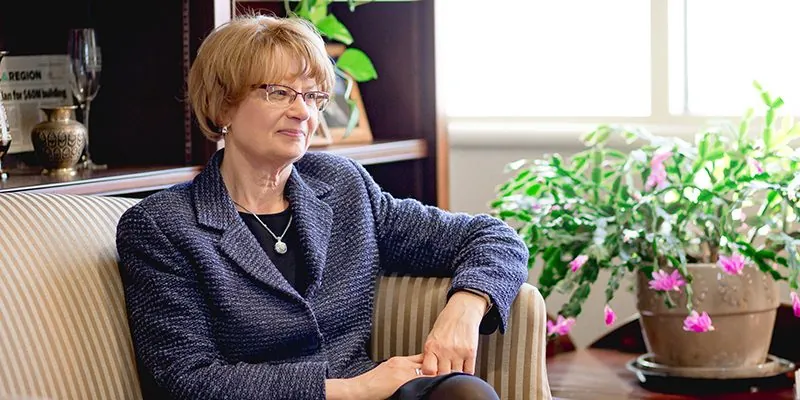
Alabama’s Kay Palan: “Whatever we do has to be right for the school and able to live beyond me. I don’t lead for my own ego. It’s about our students, our people, and the mission.” Courtesy photos
Before Kay Palan became dean of the University of Alabama’s Culverhouse College of Business, she worked in hospital trauma units. Palan was trained as a nurse — her undergraduate degree is in nursing — and she spent her early career caring for patients in high-stakes, high-pressure environments where lives were literally on the line.
That background still shapes how she leads.
“I’ve worked in real crises — people dying and bleeding to death,” Palan says. “So when we talk about change in higher ed, I can always keep it in perspective. It’s hard, but it’s not life-or-death. I stay positive. I adapt.”
Palan has led Culverhouse and its graduate arm, the Manderson Graduate School of Business, since 2016. In that time, she has overseen record enrollment, rising research productivity, and a steady climb in national rankings — all while maintaining what she calls Alabama’s core identity: a deeply personal, student-centered culture.
“We’ve always been a student-focused institution,” she says. “We write it into our mission statement — that we’ll do things on a personal interaction basis. But how do we maintain that culture with over 10,000 students?”
That question, she adds, drives nearly every strategic decision she makes.
CULTURE FIRST, STRATEGY ALWAYS

Kay Palan: “I still think it’s better to live and learn in person. But we have to be realistic. Online helps us reach people who otherwise wouldn’t be able to participate”
Under Palan’s leadership, Alabama has grown in scale and stature. The University of Alabama hit a record enrollment of over 40,000 students in fall 2024, including more than 6,000 at the graduate level. Culverhouse alone now serves more than 10,000 of them, with around 700 enrolled in graduate business programs.
Despite that growth, Palan has worked to preserve a sense of intimacy and purpose. A three-year required professional development curriculum spans the undergraduate experience, helping students build soft skills and career readiness from their first year. “We want our students to be prepared not just academically, but professionally and interpersonally,” she says.
She also sees her role as ensuring the school evolves strategically — and not reactively. “Whatever we do has to be right for the school and able to live beyond me,” she says. “I don’t lead for my own ego. It’s about our students, our people, and the mission.”
MANDERSON MBA: SMALL, STEM-POWERED, HANDS-ON
The Manderson MBA has held strong even as other full-time MBA programs contract. One major reason is Alabama’s “STEM and CREATE Path to the MBA,” a direct pipeline from undergraduate engineering and innovation-focused programs into the graduate business curriculum.
These students — many of them engineers — bring technical depth and creative energy into the cohort. “They come in with this highly structured way of thinking,” Palan says. “But business is messy. There’s uncertainty. So we give them the tools to manage that — and they enrich the classroom with their analytical mindset.”
Asked what sets Manderson apart in a competitive MBA market, Palan doesn’t hesitate. “Hands-on, personal experience. You’re not going to get that everywhere — especially at this cost. I really believe you don’t have to go to a big-name school to get a great education. You’ll get that here — and you’ll get faculty and staff who know your name.”
Manderson’s rising visibility supports that claim. The program currently ranks 54th overall and 27th among public MBA programs in U.S. News & World Report. Fortune places it at No. 59 nationally. In Poets&Quants‘ annual composite ranking, Alabama is 68th in 2025, up from 72nd in 2024. Meanwhile, Culverhouse has improved its standing in research, ranking 90th in North America in the UT Dallas research productivity index.
EMBEDDING TECH, EMBRACING FLEXIBILITY
Relevance, Palan says, starts with being close to industry — especially when it comes to evolving technologies like AI and analytics. “Some faculty are already embedding AI directly into their courses,” she notes. “We offer the content in a lot of ways — whether as a specialization, minor, or certificate. And we keep adjusting, because market demand keeps evolving.”
Manderson currently offers graduate certificates in analytics and cybersecurity, and Alabama’s business curriculum embeds data and analytics content across undergraduate and graduate programs. Many of these offerings are now online, a strategic move given the school’s non-metro location and its desire to reach working professionals.
“I still think it’s better to live and learn in person,” Palan says. “But we have to be realistic. Online helps us reach people who otherwise wouldn’t be able to participate.”
THE BUSINESS OF BUSINESS SCHOOL
Palan is clear-eyed about the shifting landscape of graduate business education. Specialized master’s degrees, stackable certificates, and just-in-time learning models are all on the rise — and the traditional MBA no longer holds the monopoly it once did.
“It’s a changing landscape. And it’s hard, because it takes so long to launch something new,” she says. “By the time we’ve done it, the bus might have already left.”
Still, she remains calm — and confident — in Alabama’s path forward.
“We adapt. That’s leadership. That’s life,” she says. “And the mission here is always the same — to do the best we can for our students. That’s what matters.”
DON’T MISS SKIP THE MAILROOM: THE MANDERSON MBA PROPELS EARLY-CAREER GRADUATES INTO SUCCESS
The post ‘We’ve Always Been Student-Focused’: Alabama Business Dean Kay Palan On Culture, AI & The Future Of The MBA appeared first on Poets&Quants.
